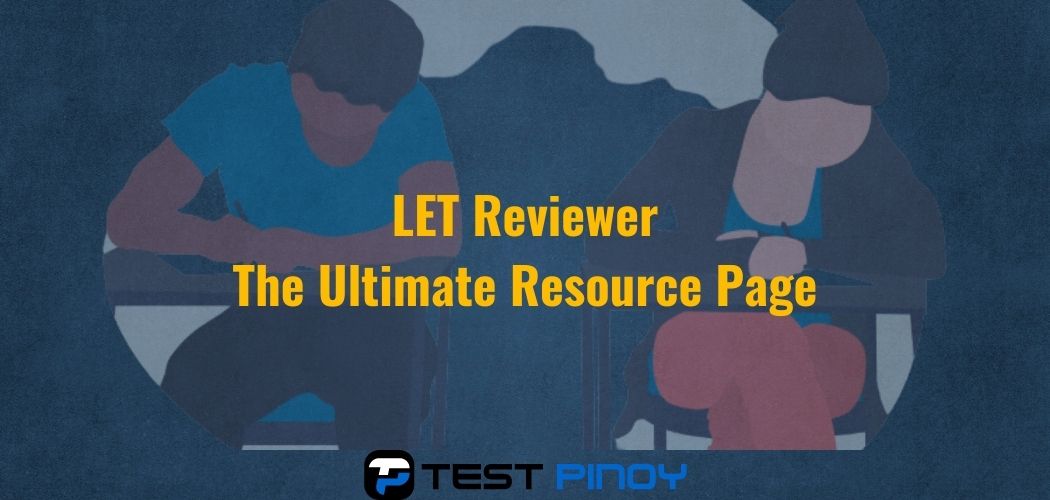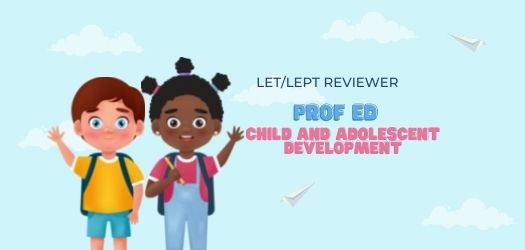This is Part 2 of our free English reviewer for the upcoming LET/LEPT covering the English subject. This has 50 multiple-choice questions (with answer key) which can be completed within one (1) hour.
Get a sense of what’s coming with this set of questions. This reviewer is intended for the General Education (Gen Ed) portion of the licensure exam but English majors can use it, too.
Recommended reading
- 5 Research-Based Techniques to Pass Your Next Major Exam
- (13 Tips From Repeaters) How to Pass the LET the First Time
- How to Remember Better: A Study Tip
Gen Ed English reviewer, part 2
Question 1. Which shows a minimal pair of /s/ and /z/?
A. Juice-peace
B. Lacy-lazy✅
C. Trace-craze
D. Seize-sees
Question 2. ______ is a grammar teaching approach where rules are given after the learners have done an intensive pattern in various contexts.
A. Inductive
B. Formal
C. Deductive
D. Functional✅
Question 3. This process of language learning is characterized by repeated practice of sentence patterns until they become automatic.
A. Language performance
B. Hypothesis testing✅
C. Habit formation
D. Overgeneralization
Question 4. If a teacher follows the communicative approach, which practices could be seen inside the classroom?
A. Teaching listening-speaking-reading-writing sequentially.
B. Focus on grammar rules.
C. Assesses the needs of the target listeners.✅
D. Emphasize oral proficiency.
Question 5. To emphasize the student’s need to identify why and for whom he/she is writing, the teacher can use:
A. Process approach
B. Controlled writing approach
C. Free writing approach
D. Communicative writing approach✅
Question 6. Filipinos find it hard to learn tenses because:
A. Tense cannot be translated into Filipino.
B. English has many tenses.
C. It is not presenting the Philippine language.
D. The Filipino tense is different from English.✅
Question 7. It _____ unfair that she should stay on stage longer.
A. has to
B. tends to
C. needs
D. seems✅
Question 8. “She transformed a dragon into a pinworm” is an example of _____.
A. Hyperbole✅
B. Metaphor
C. Metonymy
D. Alliteration
Question 9. This is the smallest unit of sound.
A. Allophone
B. Morpheme
C. Allomorph
D. Phoneme✅
Question 10. Krashen said that knowledge of grammatical rules in language performance functions as _____.
A. monitor✅
B. output
C. affect
D. input
Question 11. If a teacher wants to make an intensive drill about the basic sentence pattern, he/she should _____.
A. assign pair work
B. explain grammar rules
C. demonstrate the lesson
D. do pattern practice✅
Question 12. _____ will provide encouragement for a learner to team a language.
A. Explanation of rules
B. Self-satisfaction✅
C. Learning environment
D. Language form
Question 13. A language learner tries out his/her rules of language with a competent 2nd language speaker, he/she is _____.
A. Reviewing
B. Hypothesis testing✅
C. Generalizing
D. Practicing
Question 14. If a teacher adheres to the humanistic approach, the materials would most likely be:
A. Providing background music while reading
B. Activities for sharing one’s values and viewpoint with others✅
C. Vocabulary words for writing
D. Completing entries in a grid
Question 15. If a teacher wants to teach about the range of meaning between opposite words, he/she may use _____.
A. cline
B. context Clues✅
C. matching
D. pictures
Question 16. _____ is an example of information transfer.
A. Engaging in a small group
B. Listening and telling it to somebody✅
C. Competing grid based on a recorded talk
D. Doing a simulation
Question 17. If followed by _____ /t/, /p/, and/k/ are aspirated initial sounds.
A. an unstressed syllable
B. s stressed syllable
C. two syllables✅
D. three syllables
Question 18. A behavior must be _____ if the teacher wants it to occur again and eventually becomes a habit.
A. Corrected
B. Reinforced✅
C. Imitated
D. Modeled
Question 19. _____ will determine the difference in pronouncing “ice cream” and “I scream”.
A. Juncture
B. Pitch
C. Intonation
D. Stress✅
Question 20. _____ will determine the difference between “English teacher”- meaning a teacher who teaches English, and “English teacher”- meaning a teacher from England.
A. Juncture
B. Pitch
C. Stress✅
D. Intonation
Question 21. Continue the chain: plays, cleans, approves, bothers, _____.
A. Prepares✅
B. Links
C. Collects
D. Realizes
Question 22. Wh – questions must have _____ intonation.
A. Level
B. Falling
C. Rising
D. Rising falling✅
Question 23. A teacher who adheres to the communicative approach uses authentic materials because _____.
A. They are readily available
B. They are cheap
C. Learners are familiar with them
D. Communicative activities in real life can be built around them✅
Question 24. In the Philippines, English language teaching is aimed at:
A. Producing learners who can use English in the proper context.
B. Producing learners who have mastery of English pronunciation and grammar.
C. Producing learners who can confidently speak English.
D. Producing learners who can communicate accurately, fluently, and appropriately.✅
Question 25. Which is acceptable in English?
A. Gilbert cleaned the table up
B. Tess is eager to talk to✅
C. That she dances well surprises me
D. He desires that you go
Question 26. Choral reading is a type of reading.
A. Buddy
B. Reading aloud to students
C. Shared
D. Guided✅
Question 27. Which word in the lines below infers the moral?
A. Beauty
B. Praised
C. Favor
D. Feareth✅
Question 28. _____ states that children have the ability to relate new information to prior knowledge.
A. Sociolinguistic
B. Constructivist✅
C. Reader response
D. Interactive
Question 29. _____ makes use of Children’s language and experiences.
A. Language experience approach✅
B. Directed reading thinking activity
C. Mastery learning
D. Individualized method
Question 30. Which theory emphasizes comprehension as students read?
A. Constructivist
B. Interactive
C. Reader response✅
D. Sociolinguistic
Question 31. _____ states that children have the ability to organize and integrate information in schemata.
A. Interactive
B. Reader response
C. Constructivist✅
D. Sociolinguistic
Question 32. _____ reading takes place when two students read the text together.
A. Shared
B. Guided
C. Independent
D. Buddy✅
Question 33. _____ is a technique when the students crumple and throw and read these pieces of paper.
A. Snowball Toss✅
B. Hot Seat
C. Quaker reading
D. Carousel
Question 34. What virtue is shown in the poem below?
It’s the little things we do or say
That makes or breaks the beauty of the
Average passing day.
Heart, like doors, will open with ease
To very, little keys,
And don’t forget that two of these
Are “I thank you” and “If you please”
A. Encouragement
B. Friendliness
C. Kindness✅
D. Confidentiality
Question 35. _____ reading takes place when the leaders read each line and then the group repeats it.
A. Cumulative reading
B. Echo reading✅
C. Chorus reading
D. Small group reading
Question 36. This is an interdisciplinary unit that integrates reading and writing with social studies, science, mathematics, and values education.
A. Learning log
B. Cluster
C. Theme study
D. Collaborative report✅
Question 37. _____ is the system students use in capitalization and punctuation rules.
A. Semantic
B. Syntactic✅
C. Phonological
D. Pragmatic
Question 38. _____ is used to measure students’ reading comprehension.
A. Reading logs
B. Grand conversation
C. Anecdotal notes✅
D. Running record
Question 39. What paragraph development is most appropriate in the main idea given below?
A. Cause-effect✅
B. Analysis
C. Process
D. Classification
Question 40. _____ views children as having the ability to relate new information to prior knowledge.
A. Sociolinguist
B. Constructivist✅
C. Reader response
D. Interactive
Question 41. The press is considered the fourth estate because it _____.
A. checks all branches of government✅
B. is a powerful political force
C. is an adversary of the government
D. Acts as the fourth branch of government
Question 42. What can be implied from the statement below about mass media?
“The most important effect of mass communication is its ability to mentally order and organize the world for us.”
A. Mass media decides the type of program to air.
B. Mass media chooses advertisements for the program.
C. Selects the production number.
D. Determines what will be news and what won’t.✅
Question 43. _____ states that mass media should be state-owned to best serve the government.
A. Social responsibility✅
B. Soviet
C. Libertarianism
D. Authoritarianism
Question 44. _____ is the 9th-century entertainment that is made up of skits and musical acts that influenced modern-day TV.
A. Zarzuela✅
B. Comedia
C. Opera
D. Vaudeville
Question 45. _____ is also called the response in the communication process.
A. Reaction
B. Gesture
C. Feedback✅
D. Signal
Question 46. _____ is the process by which media people control the public’s access to news.
A. Correlating
B. Gatekeeping✅
C. Agenda-setting
D. Channeling
Question 47. What defense can a news reporter give when he is accused of invasion of privacy?
A. Victim’s welfare
B. Victim’s consent
C. Honest reporting
D. Impartial reporting✅
Question 48. _____ is shown when the government prohibited the press from interviewing President Estrada.
A. Media Law
B. Censorship
C. Prior Restraint
D. Gag order✅
Question 49. The article below is an example of:
“Residential customers of the Manila Electric Co. will see their bills go down by 43 centavos per kilowatt-hour this month, due to reduction in generation system low charges”
A. Editorial
B. Obituaries
C. Straight news✅
D. Feature article
Question 50. The phrase “human shield” in the given headline below indicates that the phrase is:
“Army accuses rebels of using civilians as a human shield.”
A. extraordinary
B. important
C. not used correctly
D. newly coined✅
Answer key
| 1. B | 11. D | 21. A | 31. C | 41. A |
| 2. D | 12. B | 22. D | 32. D | 42. D |
| 3. B | 13. B | 23. D | 33. A | 43. A |
| 4. C | 14. B | 24. D | 34. C | 44. A |
| 5. D | 15. B | 25. B | 35. B | 45. C |
| 6. D | 16. B | 26. D | 36. D | 46. B |
| 7. D | 17. C | 27. D | 37. B | 47. D |
| 8. A | 18. B | 28. B | 38. C | 48. D |
| 9. D | 19. D | 29. A | 39. A | 49. C |
| 10. A | 20. C | 30. C | 40. B | 50. D |



